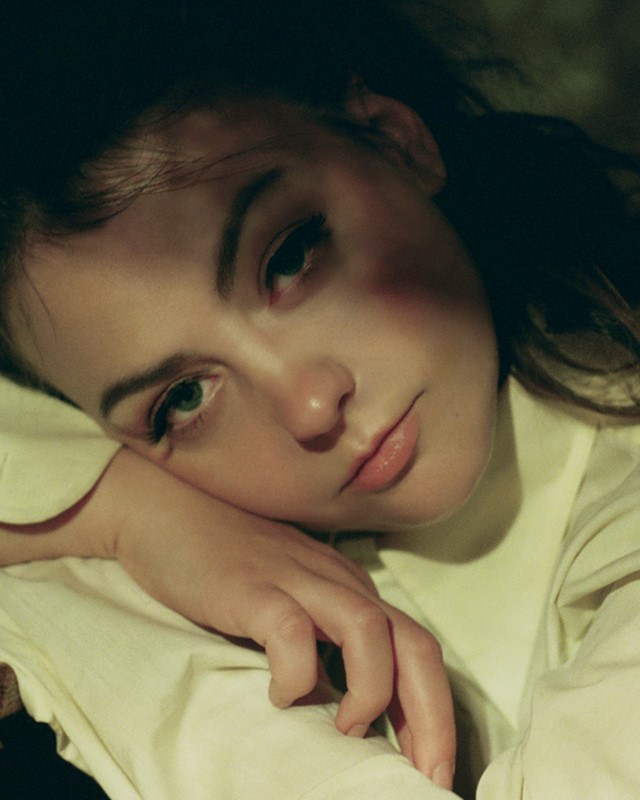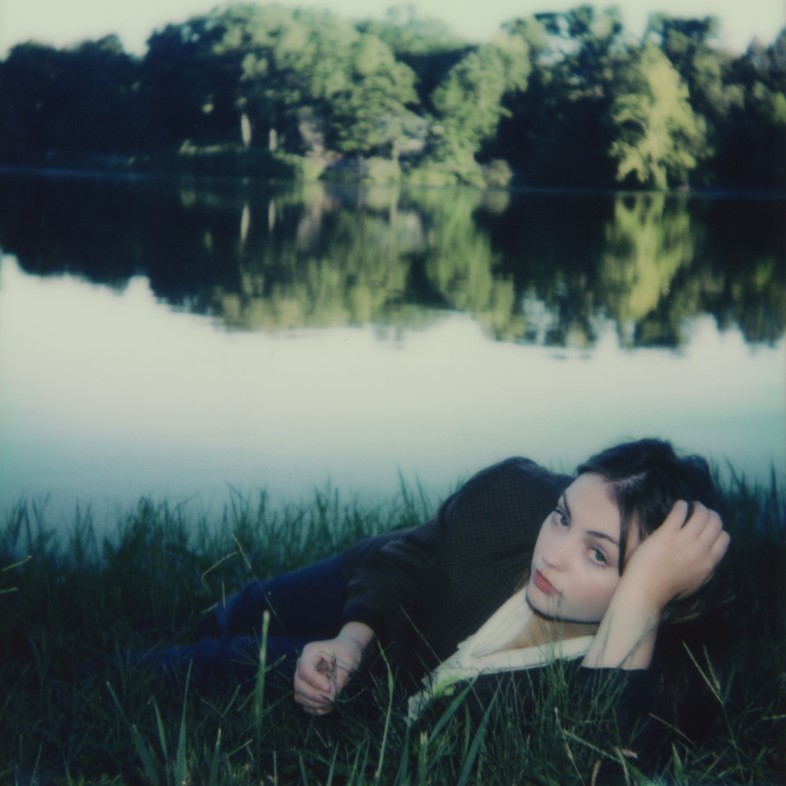The singer-songwriter’s expansive new record, Big Time, was borne out of a nightmarish, transformative two years – here, she explains how it all came together
Now on her sixth album, Angel Olsen can comfortably lay claim to being one of the finest songwriters of her generation. Along with Sharon Van Etten, Olsen’s career prefigured the explosion in women-fronted indie that we’re living through now, defined by acts like Snail Mail, Phoebe Bridgers and Julien Baker (with whom Olsen is touring later this year.) From her folk beginnings through to her scuzzy indie rock breakout era to 2019’s gorgeous, synth-drenched All Mirrors, her discography is remarkably diverse, with each album bearing a distinct and cohesive sound. Her latest, Big Time, is no exception. Incorporating elements of country and Americana, alongside 1970s rock like Big Star and Fleetwood Mac, it is both simple and expansive, even epic; the instrumental arrangements are lush and richly textured, and Olsen’s vocals at times stunning. Lead single All the Good Times, which starts quietly before exploding into an American tour-de-force, is one of the most rapturous pieces of music you’ll hear all year.
For all its triumphs, the album is the product of a profoundly difficult time. Shortly after coming out as queer, Olsen experienced the tragedy of losing both her parents in quick succession. As such, there is a fierce and at times despairing quality to Big Time, but it’s hopeful and defiant too. Below, Olsen speaks to AnOther about the influences and experiences behind one of 2022’s best records.
James Greig: Throughout your career, you have gone back-and-forth between making music that is stripped back, unadorned and intimate, and music that is grand and sumptuous, with elaborate arrangements. What is the appeal of either style for you?
Angel Olsen: Sometimes when I write, I want the words to be front and centre, and I want it to be intimate. At other times, I want to get lost in the sound; I want it to be a bit more loose, dream-like, and vague in a way that’s open to interpretation. Chasing the Sun is a great example, because it starts really intimate and then all of a sudden, it becomes this crazy, theatrical moment with strings – I wanted something that feels like we were somewhere big, like the mountains or the top of a viewpoint. Strings are good at conveying those kinds of moments, whether they're scenic or emotional. But at other times it's all about the words: I'm just getting really close, almost like I’m telling someone a secret.
JG: On this record, it feels like you’re experimenting with your voice as though it’s any other kind of instrument. How do you approach your vocals when you’re writing and recording?
AO: It’s like the record is a play, and each song is a different character. It’s about getting across a different tone; they’re all my voice but I’m leaning into different aspects of it. All the Flowers is really wispy and innocent, which is very different to Go Home, which is very defiant and frustrated. And then Big Time is really upbeat and jovial, like having a good day in the park with a friend. Sometimes I experiment with a key first or a piano or guitar, and l think about how a tone could come across. A lot of these songs are from personal experiences, so I try to recall the absolute feeling I had at the time with my voice.
“Enjoy the things that make you happy and learn how to laugh about the things that don’t. You have to accept that it will continue to get worse and weird as you get older” – Angel Olsen
JG.: How did you match Big Time’s musical styles and lyrical themes?
AO: When I met Jonathan Wilson at his studio in Topanga, I played him some of the demos, and he played me some of the recordings he was working on. I just loved the way that they sounded, and being up there in the canyon just seemed really inspiring. I had made the choice to record in July, having met him in March, and my parents passed away between that time, so the choice was already made. I had already finished most of the songs except for three, and I really wanted to get out of town. I decided that if I couldn’t finish it, that would be fine, but I needed to get out there and see, because I didn’t want to sit around anymore. I just wanted to try it, and it ended up being the exact thing that I needed to do at the time.
JG: Do you think the process of grieving informed the recording of the album at all?
AO: I think so, because I was so put out that I could only focus on singing and didn’t care about anything else. In previous recordings, I can hear myself feeling under pressure or performing for the producer. But in this environment, I really just gave it everything and I didn't overthink it. I felt in the songs in a different way, and they also had more time to breathe before I had recorded them. Whereas, in older recordings I can kind of tell it's still a new song; I'm hesitant in singing or the vocals feel calculated or something.
JG: This album has a lot of tonal extremes to it; some of the songs are very despairing or bleak, but then much of it is hopeful.
AO: I think maybe it’s just because I’m in my mid-30s and losing people in my life, alongside the pandemic, has just been really humbling and quieting. Eventually, I started to realise what matters to me most and how I really like to spend my time. I‘m sure a lot of people feel this way during all of this. Life just keeps going, and just because there’s a pandemic, it doesn’t mean that other shit doesn’t happen to you.
So I went through all this crazy stuff and then just got to a point where I realised you really do have to have to take it one day at a time, enjoy the things that make you happy and learn how to laugh about the things that don’t. You have to accept that it will continue to get worse and weird as you get older. The only way through that is to face it head on.

JG: The video for Big Time takes place in a kind of queer country salon. Here in Britain, at least, country music has a reputation for being quite straight and conservative. Do you think there’s something subversive about putting a queer spin on the genre?
AO: I mean, there are a lot of gays who love Shania Twain and Dolly Parton! I also live in a very queer southern town so there’s a lot of that there too. It’s part of one of the reasons why I like it there. People are really open-minded and progressive even in this tiny little Appalachian town, and there’s a country karaoke that happens once a week at this neighbourhood bar, which is a huge inspiration for the video. It was also just fun to try to make some country songs because country music is often really simple, right? You can convey something really intense or sad in a simple, upbeat way.
JG: All the Good Times is a sad, dejected break-up song which turns into something really euphoric and rousing. How did you balance those two elements?
AO: The song was written in 2017 and I was upset with someone at the time. It’s like you’re on the journey with me through the grief. You know when you’re in a breakup or you’re having an argument and you’re like [she speaks in an exaggeratedly quiet, small voice] “oh, I don't care anymore. It’s over.” Then all of a sudden, you’re like, “actually, you know what? No, fuck you! I’m gonna be fine!” You go through these different stages of being calm and not caring to being like, “actually, you know what? You’re the worst.”
JG: What was it like co-writing Big Time, the title track, with your partner?
AO: It was first done as an exercise. I was having a hard time: I usually go into the studio with 15 or 16 songs, with a few leftovers, but I hadn’t finished three of them and I was freaking out. And I didn’t feel like writing and my partner could tell I was frustrated, so they suggested it just as something to try for fun. I decided it would be a great title track because I had all these time travel dreams. And time really has been big, not just for me but for everybody I know. So it was less about, like, “we made the big time” and more that it’s been a big time. The song is about loving the things I’ve learned during this period even though it’s been hard.
JG: Is it harder to write a happy love song than a sad one?
AO: The more pain you experience, the more open you are, and you can love bigger after that. Although obviously for some people it’s the opposite and they become more guarded. I’ve lost all these things in the past – but without losing them I wouldn’t be here today, as the person I am.
So Big Time is not even just a love song. At the end of the day, it really is about how you see everything. Even if you sleep with someone in the same bed for 50 years, you’re still with yourself. And it’s about submitting to that, and realising that you’re on a trip.
Big Time by Angel Olsen is released on June 3
